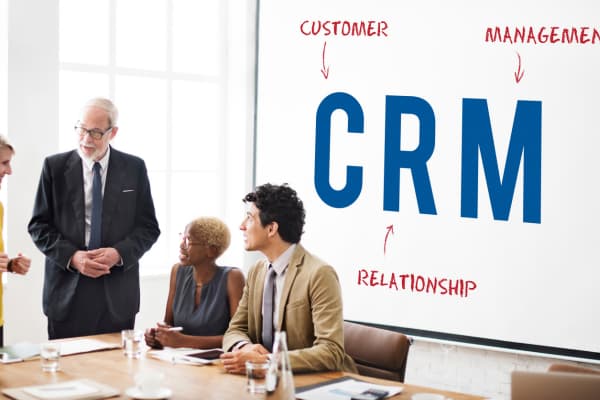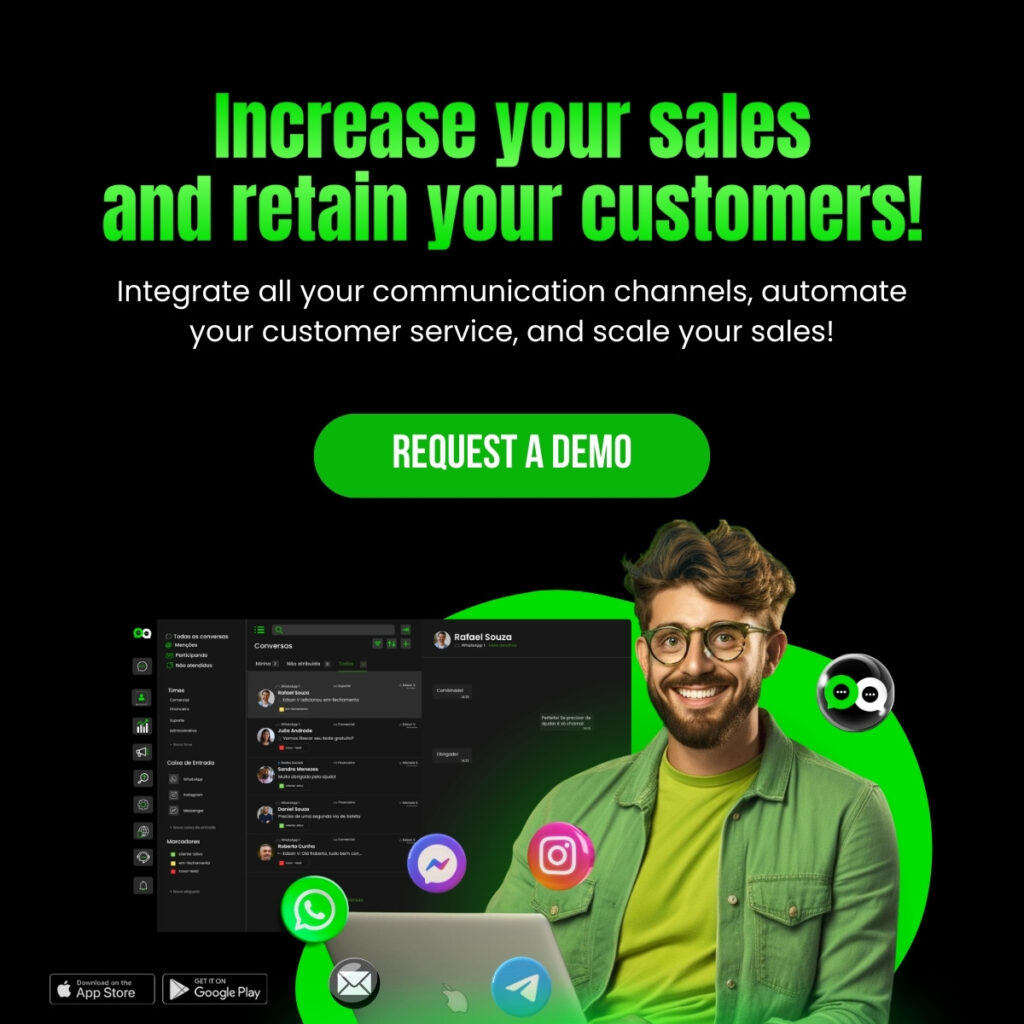Customer Relationship Management, also known in the market as CRM, goes far beyond a management platform or simple software. It involves all the processes for managing and analyzing customer interactions, anticipating needs, personalizing the customer experience, attracting new customers and, of course, selling more.
But don’t think that this tool is only available to large companies. Today it is accessible to any company that wants to sell more.
To help you understand more about customer relationship management, what it means and how to implement it in your company, we’ve created this complete material with everything you need to know. So stay with us here and become a CRM expert.
What does CRM stand for?

The acronym CRM stands for “Customer Relationship Management”. But this term goes far beyond that and beyond just software, as it is a holistic approach that encompasses sales, marketing, customer service and all the other points that involve direct contact with your consumer.
We are immersed in the age of the customer, digital transformation and the incredible technologies that emerge every day.
In this context, the relationship with the customer has evolved, starting to be called the customer experience and in this sense, the concept of CRM is directly linked to keeping the customer at the center of everything.
CRM represents not just a piece of software, but a strategy, a process and a technology focused on converting more and retaining customers.
CRM platforms occupy a prominent place among the business technologies most used by companies, but why? The answer lies in their ability to integrate and use customer information to manage accounts, leads and sales opportunities in a single place.
Read on to find out more about this strategy and learn how to implement it in the best possible way in your company.
What does Customer Relationship Management do?

CRM, or Customer Relationship Management, performs various functions, such as storing customer data like name, address, telephone number and so on.
In addition, it can store information about the customer’s points of contact with your company, such as visits to websites, calls, emails, WhatsApp messages, among other types of interactions.
However, CRM software goes far beyond presenting this data: it gathers and integrates all your customer data to prepare and keep your team up to date on your customers’ information, purchase history and preferences.
Here are some of the main functions that a good CRM performs:
Data centralization: CRM gathers all relevant customer information in one place and makes it accessible to your entire team.
This includes purchase history, past interactions, preferences, demographic data and other information relevant to your business.
Managing contacts and leads: Helps organize and follow up on contacts and leads, from the first contact, through to conversion into customers and following up after sales.
This contact management can include recording interactions, as well as automations such as scheduling follow-ups and analyzing the progress of negotiations.
Sales and Marketing Automation: CRM allows you to automate various tasks related to sales and marketing, such as sending emails, segmenting customers, creating personalized campaigns and tracking results.
Customer Service: Facilitates customer service by providing a complete overview of the history of interactions, enabling a faster and more effective response to customer queries and problems.
The best platforms also allow omnichannel integration, keeping all records saved and also serving as a customer communication tool.
Analysis and Reports: Provides tools for data analysis and report generation, enabling companies to evaluate sales performance, identify trends, make forecasts and take data-based decisions.
Personalization: Helps personalize customer interactions, allowing companies to offer a more relevant and customized experience based on individual customer preferences and behaviors.
These are just some of the features that CRM offers. Overall, the main objective of CRM is to improve customer relations, increase sales, optimize processes and boost the growth of your business.
Why is CRM so important for your company?

A CRM system is an indispensable ally for modernizing your customer service, sales and after-sales processes, as it eliminates manual and outdated processes, allowing your company to stand out in the market.
This platform is able to organize accounts and contacts in an accessible way and in real time, simplifying and speeding up the sales process, as well as providing hundreds of indicators in real time to help you make more assertive decisions.
Instead of relying on reminders on sticky notes or getting lost in spreadsheets, you can transfer leads to your sales team quickly and easily and control everything in an automated way.
Every member of staff, no matter where they are or what they are doing, will always have access to up-to-date information about customers and their interactions with the company.
With a CRM platform, your company can:
Efficient customer relationship management: CRM allows companies to manage all interactions with customers in an organized and efficient manner, ensuring that nothing is missed and that each customer receives the appropriate attention.
Improve the customer experience: By centralizing customer information and providing a complete view of their history and preferences, CRM helps companies offer a more personalized and relevant service, improving the customer experience and strengthening the bonds of loyalty.
Increase operational efficiency: By automating repetitive tasks such as sending emails, follow-ups and generating reports, CRM increases operational efficiency, allowing staff to focus on more strategic and productive activities.
Improve business decisions: With access to detailed data and analysis on sales performance, customer buying patterns and the effectiveness of marketing campaigns, companies can make more informed, data-driven decisions, minimizing risk and maximizing return on investment.
Increase sales and revenues: By identifying sales opportunities, segmenting customers more precisely and tracking leads along the sales funnel, CRM helps companies close more deals and increase their revenues.
Foster internal collaboration: By providing a centralized platform for information sharing and collaboration between sales, marketing and customer service teams, CRM fosters a culture of teamwork and goal alignment.
In short, CRM is important for your company because it helps to build stronger relationships with customers, increase operational efficiency, boost sales and improve decision-making, all of which contribute to the growth and success of the business.
What are the types of Customer Relationship Management?

There are different types of CRM that meet the specific needs of different types of companies and sectors. The main types of CRM are
Operational: This type of CRM focuses on automating and improving sales, marketing and customer service processes.
It is designed to help companies efficiently manage customer interactions throughout the entire lifecycle, from lead generation to after-sales support.
Analytical: Analytical CRM focuses on analyzing customer data to gain valuable insights and information that can be used to improve sales, marketing and customer service strategies.
It helps companies better understand customer behavior, identify trends, predict future demands and make more informed decisions.
Collaborative: Collaborative CRM is aimed at facilitating communication and collaboration between different departments and teams within the company, such as sales, marketing and customer service.
It provides a centralized platform for sharing information, collaborating on projects and coordinating efforts to provide an integrated customer experience.
Analytical-Collaborative: This type of CRM combines analytical and collaborative resources to offer a more comprehensive and integrated approach to customer relationship management.
It allows companies to collect, analyze and share customer data efficiently, facilitating collaboration between teams and decision-making based on insights.
Local CRM: This is the type of CRM that is kept on a physical server in the company and requires maintenance by an in-house technology team.
CRM in the Cloud: This is a CRM based on cloud computing, operating online and usually accessed via a web browser such as Google Chrome and does not require an in-house technology team.
Each type of CRM has its own unique features and benefits, and choosing the right one depends on the company’s specific needs and objectives.
Some companies may choose to implement a single type of CRM, while others may choose a solution that combines different types to meet their business needs.
Integrate your WhatsApp with Customer Relationship Management

Integrating WhatsApp into your CRM can bring a number of significant benefits to your business. Firstly, it allows you to centralize all customer interactions in one place, making it easier to track and manage these conversations.
In addition, integrating WhatsApp with CRM can improve operational efficiency by automating manual tasks and processes, and provide a more personalized experience for customers.
There are several ways to integrate WhatsApp into your CRM system, depending on your specific needs and preferences. The best option is to use Nexloo, which is a complete omnichannel customer service platform that comes integrated with a powerful CRM system for WhatsApp.
Another option is to use automation tools or integration platforms, such as Zapier or Integromat, to create automated workflows that connect WhatsApp to your CRM via APIs.
Benefits of integrating WhatsApp with CRM:
- Centralization of customer interactions in a single location
- Improving operational efficiency by automating tasks
- Offering a more personalized experience for customers
- Increased productivity of the sales and customer service team
- Improved follow-up and management of customer conversations
What is the difference between CRM and ERP?

CRM (Customer Relationship Management) and ERP (Enterprise Resource Planning) are two categories of business software systems that perform different but complementary functions within an organization. Here’s the difference between them:
CRM (Customer Relationship Management)
Main Focus: CRM is designed to manage customer relationships and related interactions, from customer prospecting to after-sales and customer support.
Main functionalities: The CRM’s main functionalities include contact management, sales automation, marketing, customer service, customer data analysis and personalization of interactions.
Objective: The main objective of CRM is to improve customer relations, provide a more personalized and efficient experience and increase sales and customer loyalty.
ERP (Enterprise Resource Planning)
Main Focus: ERP is a comprehensive system designed to integrate and automate business processes throughout an organization, including finance, accounting, inventory management, supply chain, human resources and much more.
Main functionalities: The ERP’s main functionalities include financial management, inventory management, purchasing management, production management, human resources, reporting and analysis.
Purpose: The main purpose of ERP is to optimize business processes, improve operational efficiency, reduce costs, increase visibility and collaboration between departments and provide real-time information for strategic decision-making.
Main Difference
The fundamental difference between CRM and ERP is the focus of each system. While CRM focuses on the customer relationship and related interactions, ERP addresses business processes throughout the organization, including areas beyond the customer relationship, such as finance, inventory and human resources.
In many organizations, CRM and ERP are implemented as separate systems that integrate with each other to provide a complete and integrated view of customers and business processes.
This integration allows companies to effectively optimize both customer relationships and internal processes to drive business growth and success.
The 11 best CRM tools on the market

Selecting the “best” CRM tools can vary according to the specific needs of each company and the features that are most important to them.
However, here are some of the main CRM tool options available on the market, based on their popularity, comprehensive functionalities and reputation:
Nexloo
Nexloo is a CRM integrated with a powerful omnichannel platform that is revolutionizing the market with new technologies and automations. With Nexloo your company can do it:
Have a single WhatsApp for the whole team: Manage all messages in a single place, with individualized conversations and complete performance and customer satisfaction indicators.
Integrate all communication channels: Integrate your WhatsApp, Facebook, Instagram, website chat, emails and many other platforms in one place, increasing the quality of service, customer retention and sales.
Complete lead management: Manage all the stages of your sales funnel with a complete CRM, relying on various automations.
Complete reports: Count on complete reports to track your customer’s journey and your team’s performance.
Chatbots with artificial intelligence: Create powerful chatbots for all your communication channels, capable of doing almost anything, from answering a question to making a complex sale.
Automatic satisfaction surveys: Create automatic satisfaction surveys whenever a conversation is closed and track your customers’ level of satisfaction with products and service.
Plans from R$79.90 per user per month.
Salesforce
One of the best-known and most widely used CRM platforms, with a wide range of features for sales, marketing and customer service.
It offers advanced customization, extensive integrations and powerful analytics.
Plans from R$125.00 per user (US$25.00) per month.
HubSpot CRM
A popular option for companies of all sizes, offering basic CRM functionality for free, plus additional features available in their paid plans. It includes marketing automation, contact management and the sales pipeline.
From US$ 1,080/month.
Microsoft Dynamics 365
A comprehensive CRM and ERP solution from Microsoft, offering a variety of modular applications for sales, marketing, customer service and business operations.
From R$416.50 per user per month.
Zoho CRM
A flexible and affordable CRM platform with a wide range of features, including sales automation, multichannel marketing, pipeline management and advanced reporting.
From R$ 225.00 (US$ 45.00) per user per month.
Pipedrive
A sales-focused CRM designed to help sales teams manage leads, track deals and close sales efficiently. It offers an intuitive interface and simple automation features.
From R$249.50 (US$49.90) per user per month.
Freshworks CRM
Formerly known as Freshsales, it is a CRM that focuses on simplifying the sales process and improving the productivity of the sales team, offering sales automation, lead scoring and integrations with various tools.
From R$295.00 (US$59.00) per user per month.
Insightly
A CRM designed for small and medium-sized businesses, offering contact management, sales automation, project management and team collaboration features.
From R$ 245.00 (US$ 49.00) per user per month.
Zendesk Sell (formerly Base)
A CRM that integrates perfectly with Zendesk, offering advanced sales features, process automation, sales forecasting and customizable reports.
From R$ 359.00 per user per month.
SugarCRM
A highly customizable CRM platform that allows you to adapt the system to your company’s specific needs. It offers sales automation, marketing, customer service and advanced analytics.
From R$ 400.00 (US$ 80.00) per user per month.
Bitrix24
A complete CRM and collaboration solution, offering tools for contact management, sales automation, marketing, customer service, as well as corporate intranet and social networks.
From R$249.00 per user per month.
It is important to carry out a detailed analysis of your company’s needs and the functionalities offered by each of these tools before making a decision.
In addition, considering cost, ease of use and scalability are also crucial aspects when choosing the best CRM tool for your business.
How can Nexloo help your company?

Nexloo is an innovative CRM platform that can help your company in many ways. Here are some of the main benefits and features that Nexloo offers:
Customer Relationship Management (CRM): Nexloo offers a complete CRM solution to help your company manage and track all customer interactions. This includes centralized storage of contact information, communication history, follow-ups and important notes about each customer.
Omnichannel communication: With Nexloo, in addition to a CRM, you have a powerful omnichannel communication platform, where you can integrate all your communication channels, such as WhatsApp, Facebook, Instagram, emails, website chat, Telegram, among many others.
Process automation: With Nexloo, you can automate repetitive and routine tasks, such as sending follow-up emails, follow-up reminders and updating customer records. This helps to increase team efficiency and ensure that no customer is overlooked.
Data Analysis: Nexloo offers advanced data analysis capabilities that allow your company to gain valuable insights into customer behavior, purchasing patterns and the effectiveness of marketing campaigns. This helps you make more informed decisions and adjust strategies as necessary.
Personalization of Interactions: Based on the data collected, Nexloo allows you to customize your interactions with customers, offering a more relevant and personalized experience. This helps to strengthen customer relations and increase customer satisfaction and loyalty.
Team Collaboration: Nexloo facilitates collaboration between team members, allowing them to share information and communicate effectively. This helps to ensure that everyone is on the same page and working together to achieve the company’s goals.
Overall, Nexloo is a powerful tool that can help your company improve customer relations, increase operational efficiency and drive business growth.
With advanced CRM capabilities, process automation and data analysis, Nexloo is the ideal partner for companies looking to stand out in a competitive market and offer an exceptional customer experience.
Did you like this content? So don’t forget to subscribe to our newsletter to stay up to date with everything we post here!
Take advantage and learn about all Nexloo solutions!




